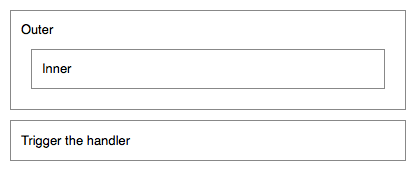.mouseout( handler )返回类型:jQuery
描述:把一个事件处理函数绑定到“mouseout”JavaScript事件,或者在元素上触发此事件。
-
增补版本:1.0.mouseout( handler )
-
handler每次触发事件时要执行的函数。
-
-
增补版本:1.4.3.mouseout( [eventData ], handler )
-
eventData类型:Anything一个对象,包含要传递给事件处理函数的数据。
-
handler每次触发事件时要执行的函数。
-
-
增补版本:1.0.mouseout()
- 此签名没有任何参数。
此方法在前两种变体中是.on( "mouseout", handler )的简写,在第三种变体中是.trigger( "mouseout" )的简写。
当鼠标指针移出某元素时,mouseout鼠标发送到该元素。任何HTML元素都可以接收此事件。
例如:考虑以下HTML:
|
1
2
3
4
5
6
7
8
9
10
|
|

事件处理函数可以绑定到任何元素:
|
1
2
3
|
|
现在当鼠标指针移出Outer <div>时,消息追加到<div id="log">后面。若要手工触发此事件,请不带参数地应用.mouseout():
|
1
2
3
|
|
执行此代码后,在Trigger the handler上面点击也将追加此消息。
因为事件冒泡,此事件可能导致很多令人头痛的问题。例如,在此示例中,当鼠标指针移出Inner元素时,也将发送mouseout事件,然后冒泡到Outer元素。这可能会不合时宜地触发绑定的mouseout处理函数。请参阅对.mouseleave()的讨论以获得有用的替代方案。
补充说明:
-
因为
.mouseout()方法是.on( "mouseout", handler )的简写,所以可以使用.off( "mouseout" )来分离。
示例:
显示mouseout事件和mouseleave事件触发的次数。
当指针移出子元素时,也引发了mouseout事件,与此同时只有当鼠标指针移出绑定的元素时,才引发mouseleave事件。
|
1
2
3
4
5
6
7
8
9
10
11
12
13
14
15
16
17
18
19
20
21
22
23
24
25
26
27
28
29
30
31
32
33
34
35
36
37
38
39
40
41
42
43
44
45
46
47
48
49
50
51
52
53
54
55
56
57
58
59
60
61
62
63
64
65
|
|